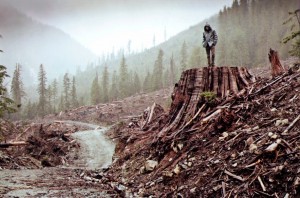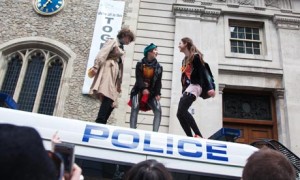 Two new documentaries have hit the screen, providing an intimate glimpse of the courageous activists trying to save our planet from reckless industrial exploitation. They offer very different portraits of the movements they seek to capture.
Two new documentaries have hit the screen, providing an intimate glimpse of the courageous activists trying to save our planet from reckless industrial exploitation. They offer very different portraits of the movements they seek to capture.
“If A Tree Falls” examines the story of a group of environmental activists who were based in Oregon in the late 90s. It offers a history of the Earth Liberation Front (ELF), and asks why it was classified by the FBI in 2001 as the nation’s “Top Domestic Terrorist Threat”?
The story is told to us through the perspective of Daniel McGowan, who is currently serving seven years in Federal prison after pleading guilty to conspiracy and arson charges. We first meet him at his home in New York, where he is preparing for his trial. Daniel comes across as articulate, compassionate and devoted to his family, a very likeable guy.
Daniel’s preparations are illustrated with 10-15 year old footage from Oregon, including non-violent direct actions blockading old growth logging in Oregon, tree sits in Eugene, and confrontational policing. One of the most distressing scenes shows police officers rubbing pepper spray directly into the eyes of protestors who are locked to the ground and unable to move. The narrative implies that it was the failure of peaceful actions like these and the violent response of the police that motivated individuals like Daniel to take more extreme action.
Other footage shows the fires that were set by the ELF: logging company offices and a university research facility razed to the ground. While these fires were clearly economically destructive, do activities where no one is killed or injured really constitute the label of ‘terrorism’? Since Daniel lives in New York, there’s a convenient juxtaposition with 9/11.
There are interviews with a broad cast including loggers, police and many other activists. The success of this film, a winner at Sundance, owes much to the balance it provides.
One of the threads linking “If A Tree Falls” with “Just Do It” (JDI) is the heavy-handed police response to peaceful activism.
 In JDI we are introduced to Marina. In the opening scenes Marina is asked why the British police have classified her as a “Domestic Extremist”. The extremist label seems absurd. Marina’s main activity at protests is making copious quantities of tea and offering cups to activists, police, workers and security guards. These cups of tea help Marina to connect with others in a calming manner. Also, she says, it’s “much better to save the alcohol for the after-party”.
In JDI we are introduced to Marina. In the opening scenes Marina is asked why the British police have classified her as a “Domestic Extremist”. The extremist label seems absurd. Marina’s main activity at protests is making copious quantities of tea and offering cups to activists, police, workers and security guards. These cups of tea help Marina to connect with others in a calming manner. Also, she says, it’s “much better to save the alcohol for the after-party”.
JDI is an “embedded documentary.” Director Emily James spent two years following English climate activists as they planned and executed nonviolent direct action on airport runways, at coal-fired power stations, at banks, and at the Copenhagen climate summit.
I’ve never seen the planning of a direct action filmed like this before (apparently James went to lengths to hide all the footage until the actions were over to ensure security for the folks involved) and this makes it very educational. We learn about different action techniques: lock-ons, affinity groups, consensus-decision making and, somewhat ironically, security protocol.
I’m struck by the incredible energy of the activists. They all speak to the fact that time is running out to halt climate change and that they feel utterly let down by policy makers. With comments such as “I want to feel like I’m doing something, rather than nothing and not just watching the world go to shit.” The focus is very much on the actions and the motivations and politics are either glossed over or simplified.
That said, it’s fast-paced and nicely shot. After watching “If A Tree Falls” I felt despair about the implosion of a peaceful environmental movement. JDI reminds me that it’s very much alive and thriving. I recommend watching them both.
JDI is raising funds to bring their film to the U.S. You can find out more and support “Just Do It” here.